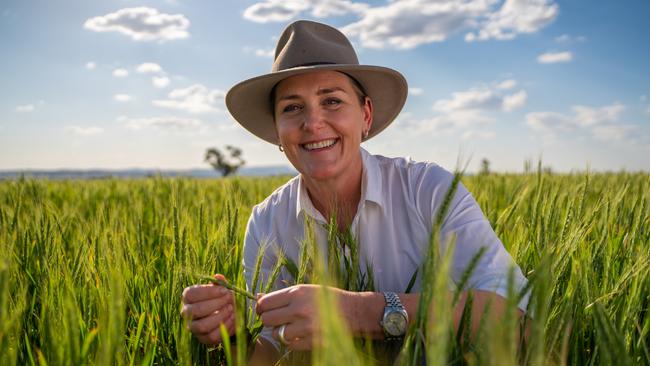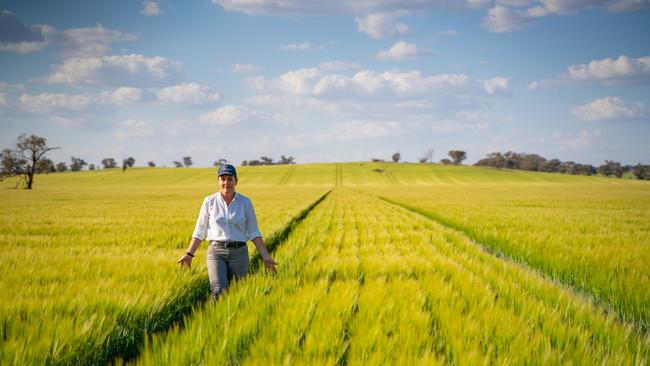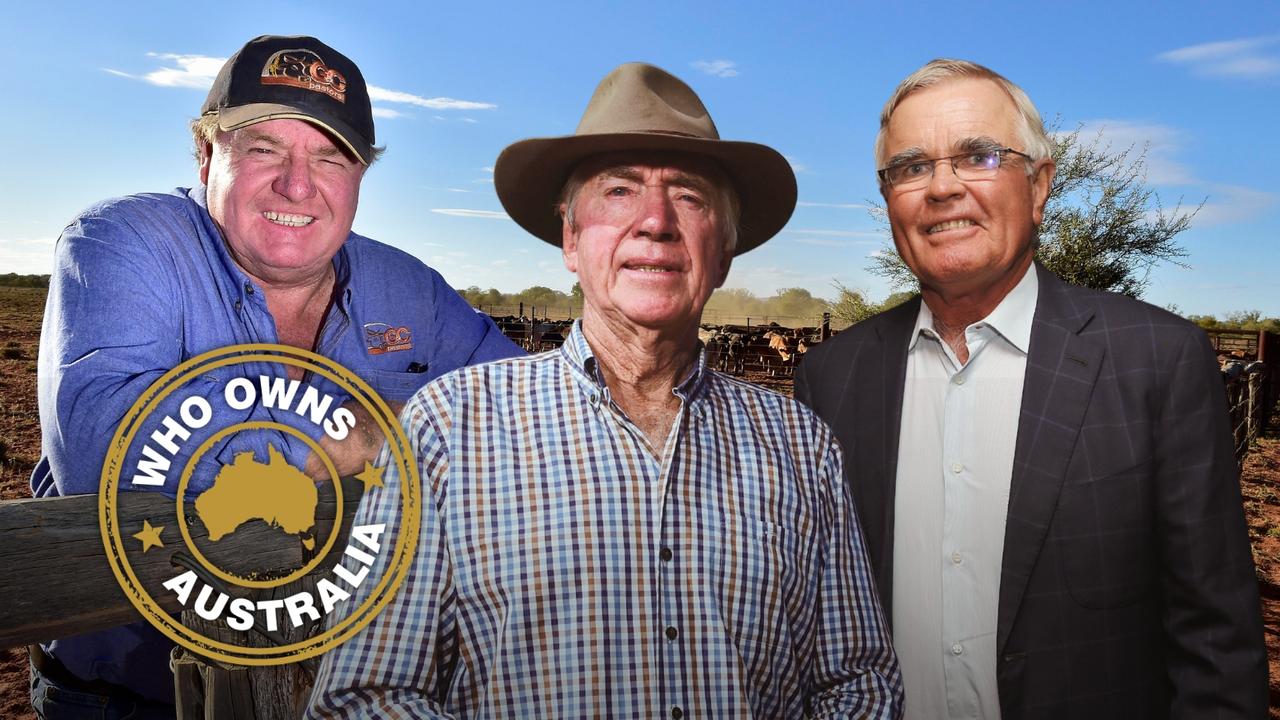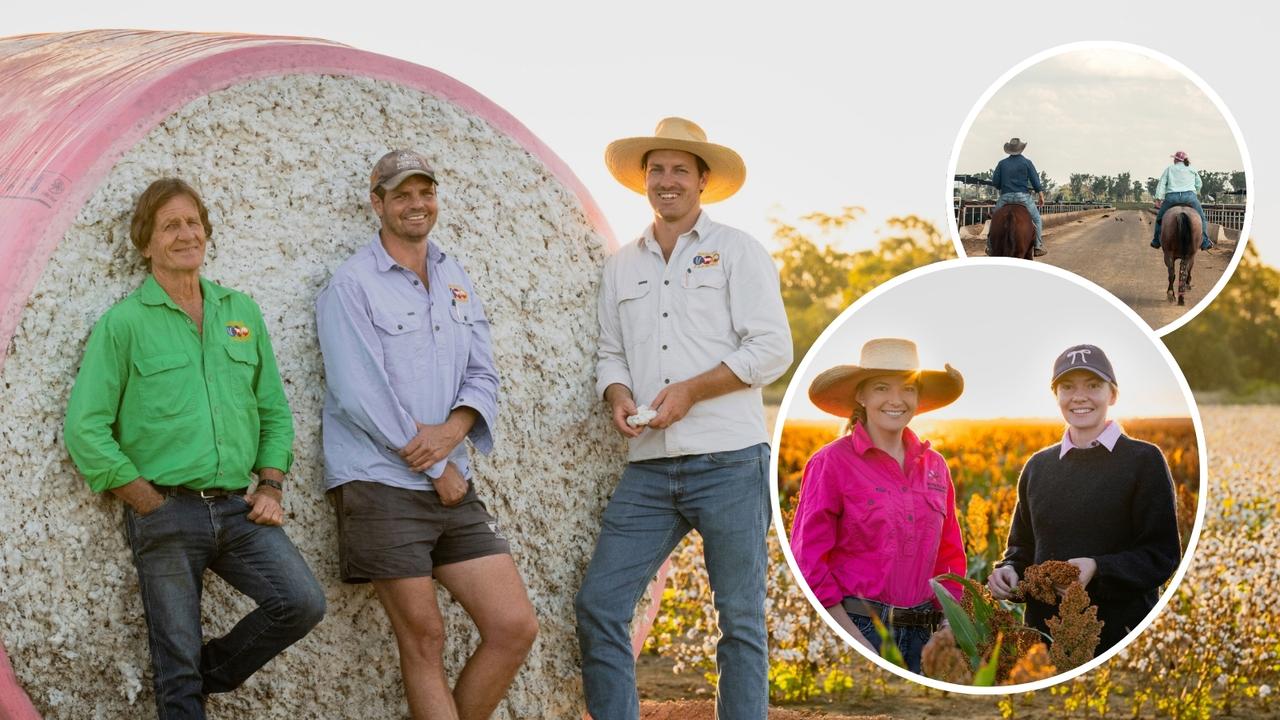Macquarie Bank’s field marshal takes charge
Macquarie Bank’s Liz O’Leary keeps firm focus on sustainability while growing the corporation’s agricultural portfolio.

LIZ O’Leary stands on a low grassy rise that passes for a hill at Canowindra in NSW’s fertile central grain belt, feeling pretty happy with her lot.
Spread out below the powerful but low-key head of agriculture at the global Macquarie banking group are thick green crops of wheat, barley, canola and chickpeas, rippling in the warm breeze and maturing ready for a bountiful November harvest.
At a time when drought is ravaging the region and bare red-dirt paddocks filled with struggling sheep are a common sight, O’Leary is proud of how her company is managing and changing 5000-hectare Gindurra, one of the most productive grain farms the giant corporation owns in Australia.
“We have to make our farms as resilient as possible and that all starts with getting the soil right,” says O’Leary, 49, who grew up on a rice, wheat and sheep farm near the Murray River at Tocumwal, NSW; one of seven girls and the admitted tomboy of the family. “If you look after the soil, it will look after you; it’s what my dad used to always say …”
But since those early days in the Riverina, never happier than sitting in a tractor alongside her adored father, the relaxed and surprisingly little-known O’Leary has risen to the top of Australian agriculture. Besides being one of the few female leaders in Australian agribusiness, she also now controls the nation’s biggest – and still growing – corporate farmer and single agricultural investor.
Macquarie Agriculture – through its global investors confidently pouring $A3.2 billion into the three special Australian-focused agricultural investment funds managed by the global Macquarie group – now owns and operates 50 large-scale farms in Australia worth a massive $2.7 billion. (A further $US250 million is invested in Brazilian agriculture).

After a recent farm-buying spree, the Sydney-based investment bank and asset manager has quietly become Australia’s biggest grain farmer, snapping up and owning more than 20 prime cropping farms in the past two years. These mainly dryland properties spread across Western Australia, NSW and South Australia’s grain belts – owned through its two dedicated crop funds Lawson Grains and Viridis Ag – grow huge volumes of wheat, barley, canola, lentils and chickpeas.
Macquarie Agriculture also ranks in the nation’s top four beef producers and landowners. Its sprawling empire of 27 Queensland outback stations and smaller southern farms in NSW and Victoria – owned through its livestock-only $1.3 billion Paraway Pastoral fund – covers more than 4.4 million hectares.
More than 30 million kilograms of beef is produced every year from Paraway’s core herd of 250,000 breeding cattle, while its 320,000-head sheep flock yields more than 1.5 million kilograms of fine wool annually and 170,000 prime lambs for meat.
READ MORE: AGJOURNAL
AGRICULTURE’S 20 HOT ISSUES FOR THE 2020S
JIGSAW FARMS HITS CARBON-NEUTRAL GOALS
More controversially, Macquarie Agriculture in August became co-owner of notorious Cubbie Station in southern Queensland, Australia’s biggest cotton farm and water user and the southern hemisphere’s largest irrigation property.
Macquarie’s third and newest fund, $1.2b Viridis Ag, bought the 49 per cent stake in the sprawling 93,000-hectare operation – which includes its own cotton processing gin at Dirranbandi – after Cubbie’s Chinese owner Shandong Ruyi sold down its original 80 per cent stake to 51 per cent, as required by the Australian Government.
The estimated $200 million-plus joint venture deal, more than two years in the making, included an unexpected pledge that in drought times when river flows through Cubbie Station are limited, the business would donate some of its stored water from the record 460 gigalitres of precious river irrigation licences it owns.
O’Leary said the promise to return up to 10 gigalitres of water back to the river system in critical low-flow periods for the benefit of downstream landholders and the beleaguered Darling River, was part of the new “controls” Macquarie had negotiated with its joint-venture partners.
The property, which can store almost as much water as Sydney Harbour in its on-farm dams, can grow up to 200 square kilometres of cotton in years when irrigation allocations are healthy. It’s an unprecedented scale of farming that has always put Cubbie Station squarely in the sights of drought-stricken farmers downstream and environmentalists who accuse it of single-handedly killing the Darling River ecosystem south of the Queensland border.
But O’Leary remains undaunted by Cubbie’s reputation, and is instead excited by the challenge and opportunities it poses. “I’m proud to own the Cubbie deal,” O’Leary tells AgJournal. “A lot of people warned me off getting involved with Cubbie Station but it is one of Australia’s premiere agricultural assets, which fits in well with both our investment portfolio and our vision.”

Since taking over as Macquarie’s agricultural chief in July 2014, O’Leary has been keen to stamp the values of long-term thinking, vision and sustainability combined with the use of cutting-edge technology on her growing agricultural empire.
There is also a decidedly green tinge, laced with hard-headed pragmatism, to O’Leary’s strategic direction, as she detects increasing global investor interest in agriculture because of the key role the sector can play in carbon farming, soil carbon sequestration and greenhouse gas emissions reduction, as well in meeting exploding world food demand.
It’s a neat fit with the broader Macquarie Group’s investment thesis – a message being particularly pushed by its global chief executive Shemara Wikramanayake – that the corporation has to be involved with businesses and investments that will grow and prosper in the decarbonised world and economy now slowly emerging from the urgent need to address climate change.
“We have no choice except to move in this direction and (at Macquarie Agriculture) we are lucky to also have the power of scale that allows us to be innovative,” says an ever-enthusiastic O’Leary.
O’Leary sees Macquarie’s big-scale Cubbie investment – with the drawn-out deal only sealed once the novel drought water-sharing pledge was agreed to by her new Chinese partners – as an example of how the financial clout of Macquarie can be used to attain beneficial and sometimes-complex long-term outcomes that individual farmers might struggle to achieve. “I am really committed in this job to being part of a solution where institutional capital can come in to a farm or rural community and, as part of our investment, can help provide a solution that has long-term sustainability of water, soil and other environmental assets – as well as sustainable agriculture – at its core,” explains O’Leary.
“You do get years where there is so much water (flowing down the rivers into Cubbie) that it is right for us to be storing it and using it to grow great crops; but at other times we shouldn’t be taking the water.
“If we aren’t good environmental managers, not just at Cubbie but on all our farms, we will lose our licence to operate both socially and potentially legally; equally because we are Macquarie, the bar has to be set higher for us in everything we do.”
It’s easy to see from O’Leary’s passion and clear vision why she was picked for the high-flying job as Macquarie ag chief five years ago following the sudden resignation of the division’s former boss Tim Hornibrook under a cloud in July 2014.
Hornibrook’s departure, as well as a long run of poor annual profits, shook the confidence of global investors in Macquarie Agricultural Funds Management, then a single $1 billion fund owning a string of large Australian outback cattle stations and a few grain farms. A safe pair of hands, who could woo rattled investors and clean up the agricultural fund’s muddy and overly-complex structure, was desperately needed.
“I couldn’t not apply,” laughs O’Leary, then employed as Macquarie’s global head of human resources in its Sydney headquarters, following years working overseas on some of Macquarie’s biggest merger and acquisitions deals. “I suddenly thought, ‘I want that job; I’m happy to risk it all’ (her high-flying Macquarie career) because agriculture has always been in my bones and I knew that I could really build that business.
“So I picked up the phone to Shemara (then-head of Macquarie’s Infrastructure and Real Assets division within which its agricultural arm sits) and said: ‘There’s a side of me that you don’t know anything about; I’ve had dirt under my fingernails from the time I was born, and it’s still there.”
While O’Leary’s appointment five years ago as head of Macquarie Agriculture now seems a stroke of genius, at the time it raised eyebrows in the macho world of Australian agribusiness.
With two young daughters, a high-powered Sydney job and a background that – at least on paper – seemed more focused on corporate culture and people management than soil science, big farm machinery, cows and cotton, there were doubters aplenty both within and outside Macquarie.
O’Leary herself describes her career path as “somewhat unconventional”. A degree in political science from the Australian National University in 1990, followed by three instructive years working in Parliament House in Canberra for the Liberal Opposition and the Fightback campaign of then-leader John Hewson, is not the normal starting point for one of Australia’s top corporate farming jobs.
Nor is running a two-person management consulting business in your late 20s from the small Victorian country town of Yea.
But when Macquarie, one of her former business clients, offered O’Leary a job in 2002, it was an offer she could not refuse. Then a single mother to one-year-old Ruby following a marriage breakdown, she was almost immediately dispatched to Hong Kong to help Macquarie with its mega-acquisition of ING’s Asian operations; the start of a whirlwind time with an expanding Macquarie that included working on big merger deals in London, New York and Philadelphia.
Back in Sydney in 2010, with a new husband, new baby and new job as Macquarie’s global human resources head, agriculture was never far from O’Leary’s mind. Her parents were then still farming at “Toc” – her father died two years ago – while O’Leary loved her part-share in a family-owned Angus cattle farm at Yea.
Privately, she had started investing in agricultural stocks, bought a second grazing property near Mittagong, NSW, and somehow managed to fit in studying for a diploma in animal genetics from the University of New England.
“I think then I was still thinking about (agriculture) long term as a possible retirement passion,” recalls O’Leary. “Then Tim (Hornibrook’s) job came up and everything changed.
“I had a vision for the business (Macquarie Agriculture); there were things that needed to be sorted out (structurally) but I saw the good roots around it and believed I could both build it as an agribusiness and bring in new investors because of my past experience.
“My goal even then was to grow it and make it a serious part of Macquarie and not just a boutique, because I believed in the overall world food-demand story and that it offered good opportunities for our investors long term.”

MIKE Carroll, who sits on the advisory board of two of Macquarie’s agricultural arms, Paraway Pastoral and Viridis Ag, admits that when O’Leary took over in 2014, the group’s agricultural activities were in a “bit of disarray”.
“Investor confidence was being tested; Liz took control, immediately streamlined the structure and gave investors much greater line of sight and confidence in the transparency of costs,” says Carroll, a former NAB Agribusiness chief executive who is also a director of several other major Australian agribusinesses, including Elders and Select Harvests.
“One of Liz’s greatest attributes is that she is a terrific judge of people, is quite disarming and can strike up a rapport or conversation with anyone, whether they are a fencing contractor in north Queensland or a high-powered investor in the Netherlands or New York.”
Change and growth have been rapid under O’Leary. In the past five years the single fund has grown to become three agricultural funds and the total funds under management have mushroomed from $1 billion to $3.2 billion by the end of this year.
Structure has been simplified so each investment fund directly owns one of Macquarie’s three farming businesses, Paraway Pastoral, Lawson Grains or Viridis Ag.
Investors now know exactly which farms are in their portfolios, and choose whether to invest in meat and livestock (Paraway), grain farming (Lawson) or a mix of dryland, irrigated and tree crops (Viridis Ag) with the focus on sustainability and new environmentally beneficial technology.
The original Paraway Pastoral Fund has been turned into a long-term “open” fund, meaning investors can come and go, and properties held long-term, rather than it having a “closed” 10-year investment term, after which the properties must be sold and returns dispersed.
A third fund, Viridis Ag, was launched in late 2017 and when fully subscribed by December, will have $1.2 billion of funds under management.
With its clear focus on long-term sustainable cropping, using minimum tillage, controlled traffic and improved soil carbon and organic matter techniques, the aim is to return soil fertility, reduce compaction and lift crop yields while reducing environmental and carbon footprints.
Already the Australian Government’s Clean Energy Finance Corporation or “green bank” has endorsed the direction taken by Viridis Ag, with a $100 million equity investment made in 2018 based on its commitment to “transformational technology” and to provide a best practice reduced-carbon footprint for the broader cropping industry.
Other global investors keen to be part of the new Viridis fund and its clean green food and sustainable agriculture story included pension and superannuation funds from Germany, the Netherlands, Canada, Korea and Japan, as well as Chinese state-owned fund. The giant $476 billion Dutch pension fund Stichting Pensioenfonds ABP is a major backer, owning just under half of Macquarie’s Paraway Pastoral fund, with its expansive cattle and land assets.
Annual profits have also risen to regularly return investors between “high single digit and low double digit” percentage returns on their funds.
About 70 per cent of returns are from the rising value of farmland over the long term as it is a “scarce asset”, with O’Leary also expecting additional capital value appreciation in line with Macquarie’s investment in every farm’s soil health, fertility, carbon content and biodiversity.
“(Agriculture) is still seen as a defensive investment and, as an asset class, only makes up a tiny portion of these big pension funds’ investments; 2 per cent at most but more usually less than 1 per cent,” explains O’Leary.
“What has changed among the investment community is there is a much better understanding that agriculture has to be a long-term investment; especially with livestock because we are making decisions now, such as genetic choices, that won’t come to fruition for five to 10 years from now.
“The approach by these investors has also changed and matured. The investment commitment has got bigger; $100 million-plus would be the minimum now.”
The establishment of the new Viridis Ag fund and the opening of the $1.3 Paraway fund to new money, alongside the strong interest by big global investors in Australian agriculture, has allowed Macquarie to enjoy a spending splurge over the past two years.
Besides its Cubbie station plunge, O’Leary spent $300 million in September 2018 snapping up the Hassad Food group and its nine sizeable farming “aggregate” properties across Australia, previously owned by the Qatari Government. The deal added 100,000 hectares of grazing and cropping country to Macquarie’s rural empire, split between its Paraway pastoral and Viridis Ag funds.
Then there was $32 million spent by Viridis in January 2018 buying the 16,500-hectare showpiece farm, The Grange, at Dongara, 300km north of Perth. The deal looked smart for Macquarie, as the blue-ribbon property was being sold by financially strapped Mauro Balzarini, former chief executive and major shareholder in live export company Wellard, who had lashed out $40 million for The Grange six years earlier.
Another $50 million was invested in central NSW, buying the grain farms of Ceres Agriculture, while two years earlier Paraway – which O’Leary describes as a “ripper of a business” with room for growth despite its $1.3 billion of assets – splurged $132 million to acquire two of Queensland’s largest and oldest cattle stations, Rocklands near Camooweal in the Gulf and Tanbar on Cooper Creek in the Channel Country.

ONE of O’Leary’s instrumental early decisions was to move the three farming businesses from Macquarie’s shiny skyscraper in the heart of Sydney to regional Australia.
More than 320 employees work on Macquarie’s farms, reporting to its key operational offices in Orange, NSW, where Paraway Pastoral and its chief executive Jock Whittle are based, or to Albury, southern NSW, which Lawson Grains and Viridis Ag – headed by managing director Sean O’Reilly – call home.
Only 14 of Macquarie Agriculture’s staff are left working in Sydney, where their focus is on the investor relations and funds management side of the business, rather than the production, strategy and day-to-day running of its farms. “That was one of the most important decisions I made,” says O’Leary.
“It was culture-setting; what I was saying (to staff within the group) was that if you don’t want to work in regional Australia or aren’t prepared to move there, then you are probably not the right person for us, because that is what our business is.
“We are unusual because (unlike other major agricultural investment funds, such as Westchester) we don’t just buy the land and lease it out to others to farm, we operate our farms ourselves, and that’s where our people live. “It’s also great to see what moving a significant number of staff to a place like Orange can do for a country town.
“We also buy local as much as we can, and make sure our big purchasing contracts for things like farm chemicals go through local dealers, because, if we are to be successful in the places where are farms are, we need to take a whole-of-community approach.”
With $500 million of inflowing cash still to invest burning a hole in O’Leary’s pocket as the Viridis fundraising completes, Macquarie Ag’s head admits she is “keeping her powder dry” and looking at new options and opportunities. Macquarie already owns extensive avocado plantations in far north Queensland – which unlike all its other farms it leases out (to the Costa Group) rather than managing itself – and further investments in horticulture are on the cards. Some funds may be directed to glasshouse or covered fruit and vegetable crops to reduce risk, although scale will remain a priority.
READ MORE: AGJOURNAL
FARMERS FLOCK TO PADDOCK-TESTED AGTECH
PLANT-BASED PROTEINS PLAY ON GUILT
HUGE DEALS DAZZLE AG PROPERTY MARKET
“We still think there is plenty of room to grow in the Australian market and some of that will be doing more of what we already do well, whether it is large cropping farms within Lawson or Viridis, or more growth in livestock (production) in Paraway,” says O’Leary.
“But I’m mindful we will need to continue to broaden our base and broaden our strategy; that could be investment in other countries or in areas (of agriculture) where we currently aren’t.”
Every farm in the Macquarie asset portfolio is currently being individually measured and “baselined” for soil carbon, tree cover, native vegetation and biodiversity assets in anticipation of future changes.
“Even though there is no money in it for us now, I want to make sure farmers don’t miss out and instead benefit as we move to a low-carbon economy; at Macquarie we are always thinking about how we can participate in this rise of ecosystem services,” O’Leary says.
“We have this huge global consumer interest around food traceability, health, sustainability, biodiversity and carbon emissions, but I’d like to see a world where there is a price signal benefit passed down to those (farmers) who best meet that consumer demand.”



